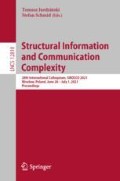Abstract
In the multiparty equality problem, each of the n nodes starts with a k-bit input. If there is a mismatch between the inputs, then at least one node must be able to detect it. The cost of a multiparty equality protocol is the total number of bits sent in the protocol. We consider the problem of minimizing this communication cost under the local broadcast model for the case where the underlying communication graph is undirected. In the local broadcast model of communication, a message sent by a node is received identically by all of its neighbors. This is in contrast to the classical point-to-point communication model, where a message sent by a node to one of its neighbors is received only by its intended recipient.
Under point-to-point communication, there exists a simple protocol which is competitive within a factor 2 of the lower bound [1]. In this protocol, a rooted spanning tree is fixed and each node sends its entire input to its parent in the tree. On receiving a value from its child, a node compares it against its own input to check if the two values match. Ignoring lower order additive terms, a more complicated protocol comes within a factor \({4/3}\) of the lower bound and is tight for certain classes of graphs [1]. Tight results, ignoring lower order terms, are also known for complete graphs [2, 9].
We study the multiparty equality problem under the local broadcast model. Recently, our work has shown that the connectivity requirements for Byzantine consensus are lower in the local broadcast model as compared to the classical model [7, 8]. In this work,
-
1.
we identify a lower bound for the multiparty equality problem in this model.
-
2.
we first identify simple protocols, wherein nodes are restricted to either transmit their entire input or not transmit anything at all, and find that these can cost \(\varOmega (\log n)\) times the lower bound using existing example for the set cover problem [12].
-
3.
we then design a protocol to solve the problem within a constant factor of the lower bound.
This research is supported in part by the National Science Foundation awards 1409416 and 1733872, and Toyota InfoTechnology Center. Any opinions, findings, and conclusions or recommendations expressed here are those of the authors and do not necessarily reflect the views of the funding agencies or the U.S. government.
Access this chapter
Tax calculation will be finalised at checkout
Purchases are for personal use only
Notes
- 1.
Note that the node detecting a mismatch between inputs can propagate this to the rest of the graph with an overhead that is independent of k, but not of n.
References
Alon, N., Efremenko, K., Sudakov, B.: Testing equality in communication graphs. IEEE Trans. Inf. Theory 63(11), 7569–7574 (2017)
Alon, N., Moitra, A., Sudakov, B.: Nearly complete graphs decomposable into large induced matchings and their applications. In: Proceedings of the Forty-Fourth Annual ACM Symposium on Theory of Computing, STOC 2012, pp. 1079–1090. Association for Computing Machinery, New York (2012). https://doi.org/10.1145/2213977.2214074
Chattopadhyay, A., Rudra, A.: The range of topological effects on communication. In: Halldórsson, M.M., Iwama, K., Kobayashi, N., Speckmann, B. (eds.) ICALP 2015. LNCS, vol. 9135, pp. 540–551. Springer, Heidelberg (2015). https://doi.org/10.1007/978-3-662-47666-6_43
Chen, Y.P., Liestman, A.L.: Approximating minimum size weakly-connected dominating sets for clustering mobile ad hoc networks. In: Proceedings of the 3rd ACM International Symposium on Mobile Ad Hoc Networking & Computing, MobiHoc 2002, pp. 165–172. Association for Computing Machinery, New York (2002). https://doi.org/10.1145/513800.513821
Dubhashi, D., Mei, A., Panconesi, A., Radhakrishnan, J., Srinivasan, A.: Fast distributed algorithms for (weakly) connected dominating sets and linear-size skeletons. J. Comput. Syst. Sci. 71(4), 467–479 (2005). https://doi.org/10.1016/j.jcss.2005.04.002. http://www.sciencedirect.com/science/article/pii/S002200000500053X
Dunbar, J.E., Grossman, J.W., Hattingh, J.H., Hedetniemi, S.T., McRae, A.A.: On weakly connected domination in graphs. Discrete Math. 167–168, 261–269 (1997). Selected Papers 15th British Combinatorial Conference. https://doi.org/10.1016/S0012-365X(96)00233-6. http://www.sciencedirect.com/science/article/pii/S0012365X96002336
Khan, M.S., Naqvi, S.S., Vaidya, N.H.: Exact Byzantine consensus on undirected graphs under local broadcast model. In: Proceedings of the 2019 ACM Symposium on Principles of Distributed Computing, PODC 2019, pp. 327–336. Association for Computing Machinery, New York (2019). https://doi.org/10.1145/3293611.3331619
Khan, M.S., Tseng, L., Vaidya, N.H.: Exact Byzantine consensus on arbitrary directed graphs under local broadcast model. In: 23rd International Conference on Principles of Distributed Systems (OPODIS 2019). Leibniz International Proceedings in Informatics (LIPIcs), vol. 153, pp. 30:1–30:16. Schloss Dagstuhl-Leibniz-Zentrum fuer Informatik, Dagstuhl, Germany (2020). https://doi.org/10.4230/LIPIcs.OPODIS.2019.30. https://drops.dagstuhl.de/opus/volltexte/2020/11816
Liang, G., Vaidya, N.: Multiparty equality function computation in networks with point-to-point links. In: Kosowski, A., Yamashita, M. (eds.) SIROCCO 2011. LNCS, vol. 6796, pp. 258–269. Springer, Heidelberg (2011). https://doi.org/10.1007/978-3-642-22212-2_23
Reed, I.S., Solomon, G.: Polynomial codes over certain finite fields. J. Soc. Ind. Appl. Math. 8(2), 300–304 (1960)
Swaminathan, V.: Weakly connected domination in graphs. Electron. Notes Discrete Math. 33, 67–73 (2009). International Conference on Graph Theory and Its Applications. https://doi.org/10.1016/j.endm.2009.03.010. http://www.sciencedirect.com/science/article/pii/S1571065309000298
Vazirani, V.V.: Approximation Algorithms. Springer, Heidelberg (2003). https://doi.org/10.1007/978-3-662-04565-7
Yao, A.C.C.: Some complexity questions related to distributive computing (preliminary report). In: Proceedings of the Eleventh Annual ACM Symposium on Theory of Computing, STOC 1979, pp. 209–213. Association for Computing Machinery, New York (1979). https://doi.org/10.1145/800135.804414
Author information
Authors and Affiliations
Corresponding author
Editor information
Editors and Affiliations
Rights and permissions
Copyright information
© 2021 Springer Nature Switzerland AG
About this paper
Cite this paper
Khan, M.S., Vaidya, N.H. (2021). Testing Equality Under the Local Broadcast Model. In: Jurdziński, T., Schmid, S. (eds) Structural Information and Communication Complexity. SIROCCO 2021. Lecture Notes in Computer Science(), vol 12810. Springer, Cham. https://doi.org/10.1007/978-3-030-79527-6_15
Download citation
DOI: https://doi.org/10.1007/978-3-030-79527-6_15
Published:
Publisher Name: Springer, Cham
Print ISBN: 978-3-030-79526-9
Online ISBN: 978-3-030-79527-6
eBook Packages: Computer ScienceComputer Science (R0)

